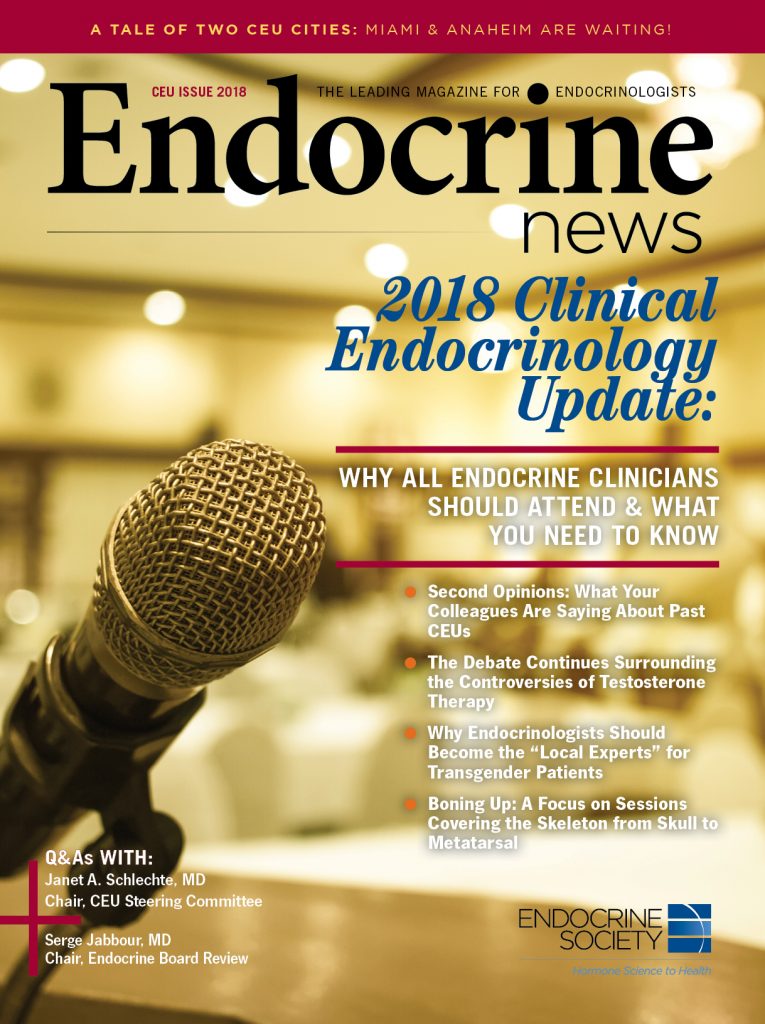
As the transgender community continues to grow, it’s becoming more and more likely that a practicing endocrinologist will encounter such a patient. A CEU session presented by Joshua Safer, MD, executive director of the Mount Sinai Health System for Transgender Medicine and Surgery in New York, will address the special needs of this growing patient population.
This year, the Endocrine Society’s Clinical Endocrinology Update (CEU) will take place in two locations, Miami and Los Angeles, which means attendees on both coasts can brush up on the latest breakthroughs and best ways to care for patients. The presenters, as always, share what they’ve learned and what they practice on the cutting edge of endocrine science.
A relatively new field in endocrinology is the treatment of transgender patients. New and small, it’s a field that needs to adapt and grow, as more people are identifying as transgender. A June 2016 study from the University of California Los Angeles School of Law’s Williams Institute found that about 0.6% of the U.S. adult population identifies as transgender. “This figure is double the estimate that utilized data from roughly a decade ago and implies that an estimated 1.4 million adults in the U.S. identify as transgender,” the authors (Flores, et al) write. That’s not a small number, and it’s a number that will continue to grow, and endocrinologists have the opportunity to be on the forefront of treating this rising population.
“The point will be to look at strategy for hormone care as well as the current concerns about potential pitfalls of hormone care and how those can be mitigated by monitoring them carefully if necessary and/or other interventions.” – Joshua Safer, MD, executive director, Mount Sinai Health System Center for Transgender Medicine and Surgery, New York
Joshua Safer, MD, executive director of the Mount Sinai Health System Center for Transgender Medicine and Surgery (CTMS), is an internationally renowned clinical endocrinologist and leading authority in transgender medicine. He was a co-author of the Endocrine Society guidelines for the medical care of transgender patients and was previously the founding medical director of the Center for Transgender Medicine and Surgery at Boston Medical Center and Boston University School of Medicine. Safer is president of the United States Professional Association for Transgender Health (USPATH) and the steering committee co-chair of the international transgender research consortium, TransNet. Safer also serves on the Global Education Initiative committee for the World Professional Association for Transgender Health (WPATH), on the Standards of Care revision committee for WPATH, and as a scientific co-chair for WPATH’s international meeting.
Closing Education & Treatment Gaps
Now, Safer is bringing his expertise on treating transgender patients to CEU. His research centers on demonstrating the health and quality-of-life benefits of increased access to care for transgender patients, and his CEU lectures will focus on caring for transgender women.
“The point will be to look at strategy for hormone care as well as the current concerns about potential pitfalls of hormone care and how those can be mitigated by monitoring them carefully if necessary and/or other interventions,” Safer says. “There will also be some discussion about how big those concerns really even seem to be based on the current literature and what the gaps are in terms of even making those assessments and then what the needs for future study are.”
If the primary care provider has less expertise or comfort or there’s a more difficult concern relating to other medical conditions, then the most convenient endocrinologist in that system or in that community would be, like for other common hormone questions, able to serve as the resource for guiding that patient and that primary care provider.” – Joshua Safer, MD, executive director, Mount Sinai Health System Center for Transgender Medicine and Surgery, New York
Of course, the goal of CEU as a whole is to help shape practicing endocrinologists into endocrine experts in their communities, and Safer’s talks will be no different. He says that in a perfect world, primary care providers would be comfortable answering questions from their transgender patients about hormones, whether it’s a question about a simple hormone regimen or more sophisticated concerns about the relative safety of hormones in people who have medical conditions. “The endocrinologist, like for every other hormone question, needs to be the local expert on that subject, this too,” Safer says.
Getting Up to Speed
Safer says that this year’s CEU meetings are opportunities for endocrinologists to get up to speed and get comfortable with answering those questions and provide the best access to care they can for their transgender patients, since most practicing endocrinologists have not received training on treating transgender patients in the past. “This has not been taught in conventional medical curricula, not medical school, not residency, not fellowship,” he says.
For Safer, the future of transgender care looks like this, with endocrinologists emerging as leaders in the field: “It should be the case that a transgender individual should be able to say, ‘Oh, I’m transgender,’ or ‘I think I’m transgender,’ or maybe a parent says, ‘I think my kid is transgender.’ If the primary care provider has less expertise or comfort or there’s a more difficult concern relating to other medical conditions, then the most convenient endocrinologist in that system or in that community would be, like for other common hormone questions, able to serve as the resource for guiding that patient and that primary care provider.”
Bagley is the senior editor of Endocrine News. He wrote about provider bias in recommending surgery for younger obese patients in the July issue.

